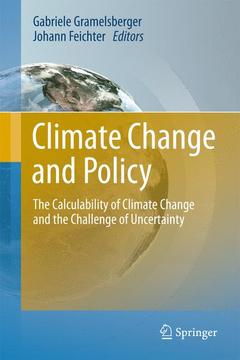Climate Change and Policy, 2011 The Calculability of Climate Change and the Challenge of Uncertainty
Coordonnateurs : Gramelsberger Gabriele, Feichter Johann

The debate on how mankind should respond to climate change is diverse, as the appropriate strategy depends on global as well as local circumstances.
As scientists are denied the possibility of conducting experiments with the real climate, only climate models can give insights into man-induced climate change, by experimenting with digital climates under varying conditions and by extrapolating past and future states into the future.
But the ?nature? of models is a purely representational one. A model is good if it is believed to represent the relevant processes of a natural system well. However, a model and its results, in particular in the case of climate models which interconnect countless hypotheses, is only to some extent testable, although an advanced infrastructure of evaluation strategies has been developed involving strategies of model intercomparison, ensemble prognoses, uncertainty metrics on the system and component levels. The complexity of climate models goes hand in hand with uncertainties, but uncertainty is in conflict with socio-political expectations. However, certain predictions belong to the realm of desires and ideals rather than to applied science. Today?s attempt to define and classify uncertainty in terms of likelihood and confidence reflect this awareness of uncertainty as an integral part of human knowledge, in particular on knowledge about possible future developments. The contributions in this book give a first hand insight into scientific strategies in dealing with uncertainty by using simulation models and into social, political and economical requirements in future projections on climate change. Do these strategies and requirements meet each other or fail?
The debate on how mankind should respond to climate change is diverse, as the appropriate strategy depends on global as well as local circumstances. As scientists are denied the possibility of conducting experiments with the real climate, only climate models can give insights into man-induced climate change, by experimenting with digital climates under varying conditions and by extrapolating past and future states into the future. But the 'nature' of models is a purely representational one. A model is good if it is believed to represent the relevant processes of a natural system well. However, a model and its results, in particular in the case of climate models which interconnect countless hypotheses, is only to some extent testable, although an advanced infrastructure of evaluation strategies has been developed involving strategies of model intercomparison, ensemble prognoses, uncertainty metrics on the system and component levels. The complexity of climate models goes hand in hand with uncertainties, but uncertainty is in conflict with socio-political expectations. However, certain predictions belong to the realm of desires and ideals rather than to applied science. Today's attempt to define and classify uncertainty in terms of likelihood and confidence reflect this awareness of uncertainty as an integral part of human knowledge, in particular on knowledge about possible future developments. The contributions in this book give a first hand insight into scientific strategies in dealing with uncertainty by using simulation models and into social, political and economical requirements in future projections on climate change. Do these strategies and requirements meet each other or fail?
Gabriele Gramelsberger is Principal Investigator of the Collaborative Research Project
is Principal Investigator of the Collaborative Research Project1 Introduction to the Volume.- 2 Modelling the Climate System – An Overview.- 3 Climate Simulation, Uncertainty, and Policy Advice - The Case of the IPCC.- 4 Dealing with Uncertainty – From climate research to integrated assessment of policy options.- 5 Uncertainty in Climate Policy – Impacts on Market Mechanisms.- 6 Insuring climate change – Managing political and economic uncertainties in flood management.- 7 Climate Science, Weather and Climate Engineering, and Scientific Objectivity.- 8 Utilizing participatory scenario-based approaches to design proactive responses to climate change in the face of uncertainties.- 9 Image Politics – Picturing uncertainty. The role of images in climatology and climate policy.- 10 Glossary and Abbreviations.- 11 Authors.- 12 Index.
Gabriele Gramelsberger investigates as a science philosopher at the FU Berlin the influence of computer based simulations as new scientific tools for knowledge production, in particular in climate research. Since 2002 she is a member of the BBAW initiative “Science Policy Studies”. 2007 she received the Blankesee-Colloquium Award from the presidents of the Berlin universities and academies.
Johann Feichter is head of the group “Aerosols, Clouds and Climate” at the Max Planck Institute for Meteorology Hamburg. He worked on the development of the German climate model and contributed to the 3rd and 4th IPCC assessment reports.
Date de parution : 10-2014
Ouvrage de 241 p.
15.5x23.5 cm
Date de parution : 03-2011
Ouvrage de 241 p.
15.5x23.5 cm



